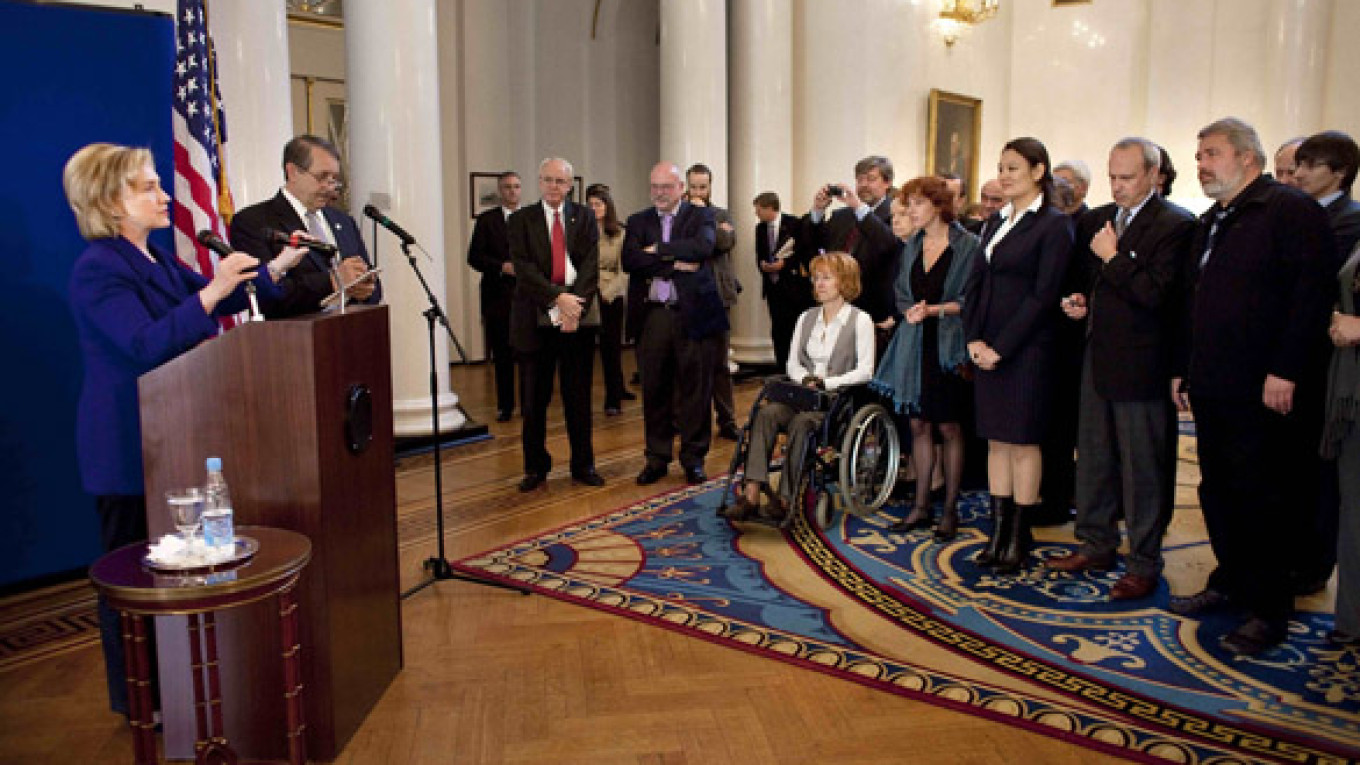Secretary of State Hillary Clinton failed to significantly advance the much-hailed “reset” of U.S.-Russian ties during Moscow talks Tuesday, with senior officials indicating that Washington could not count on Moscow’s support for new Iranian sanctions.
But President Dmitry Medvedev assured Clinton that relations had improved greatly this year, warm words for a secretary of state who was left red-faced when she produced a misspelled reset button as a souvenir at her first round of diplomatic talks with Russia last spring.
“Our cooperation with the new U.S. administration has reached new heights,” Medvedev said at a meeting with Clinton at his Barvikha residence outside Moscow, Interfax reported.
Earlier Tuesday, Clinton got a cool welcome from Foreign Minister Sergei Lavrov on the issue of containing Iran’s nuclear ambitions, perhaps the most salient issue in bilateral ties. Lavrov reiterated Moscow’s long-standing line, telling a joint news conference that slapping more sanctions on Iran would be counterproductive.
And Medvedev told Clinton that sanctions were only an option if Iran failed to allow full inspections of a previously undisclosed nuclear site and fulfill other agreements struck in Geneva last month, a State Department official told reporters, Reuters reported.
Clinton put on a brave face, saying the United States agreed that it was important to pursue diplomacy.
She said Washington did not ask Moscow to take any specific steps in helping persuade Iran to allay fears about its nuclear program. “We did not ask for anything today. We reviewed the situation and where it stood, which I think was the appropriate timing for what this process entails,” Clinton said.
But she added, “In the absence of significant progress and assurance that Iran is not pursuing nuclear weapons, we will be seeking to rally international opinion behind additional sanctions.”
Echoing her comments, Lavrov said neither country had asked the other for anything in dealing with Iran and it would be odd to do so because “our positions coincide.”
Lavrov also said both sides had made considerable progress toward a new strategic arms treaty to replace the 1991 Strategic Arms Reduction Treaty that expires in December.
Clinton called missile defense another area for deep cooperation and promised the United States would be as transparent as possible.
She apologized for missing a summit between Presidents Medvedev and Barack Obama in Moscow in July because of a broken elbow. “Now both my elbow and our relationships are reset and we’re moving forward, which I greatly welcome,” she said.
The promise to reset ties, which plummeted to post-Cold War lows under the previous administration of President George W. Bush, was first voiced by Vice President Joe Biden in February. Clinton has been mocked on the issue since March, when she presented Lavrov at their first meeting in Geneva with a button labeled incorrectly in Russian “peregruzka,” or overload, instead of “perezagruzka” for reset.
“I feel very good about the so-called reset,” Clinton said Tuesday.
The secretary of state also met with human rights activists and civil society representatives, continuing a tradition of most visiting U.S. officials.
Lev Ponomaryov, a veteran campaigner who attended the meeting, said Clinton understands how hard it is for rights activists to work in Russia. He also said the meeting showed Washington’s unwavering commitment to Russian activists. “The good news is that this was a routine meeting and that nothing has changed,” he told The Moscow Times after the event in Spaso House, the U.S. ambassador’s residence.
Ponomaryov also said he was relieved that U.S. officials had denied a news report that Washington had decided to tone down public criticism of Moscow’s human rights record to pursue a more constructive relationship.
Kommersant on Tuesday seized on comments by Obama’s top adviser on Russia, Michael McFaul, after a Kremlin meeting on Monday, saying he had indicated that the United States no longer intended to press Russia on democracy. A U.S. Embassy spokesman said the newspaper had misinterpreted McFaul’s remarks and Washington would still bring up democracy and rights issues on a regular basis.
McFaul said Tuesday that the United States would adopt a new approach toward strengthening civil society. “Rather than us telling the Russian government how to act and giving money to NGOs, and we’ll continue to do those things, but a new idea is: Let’s put our societies together. And let the governments get out of the way of those connections,” he told Interfax.


